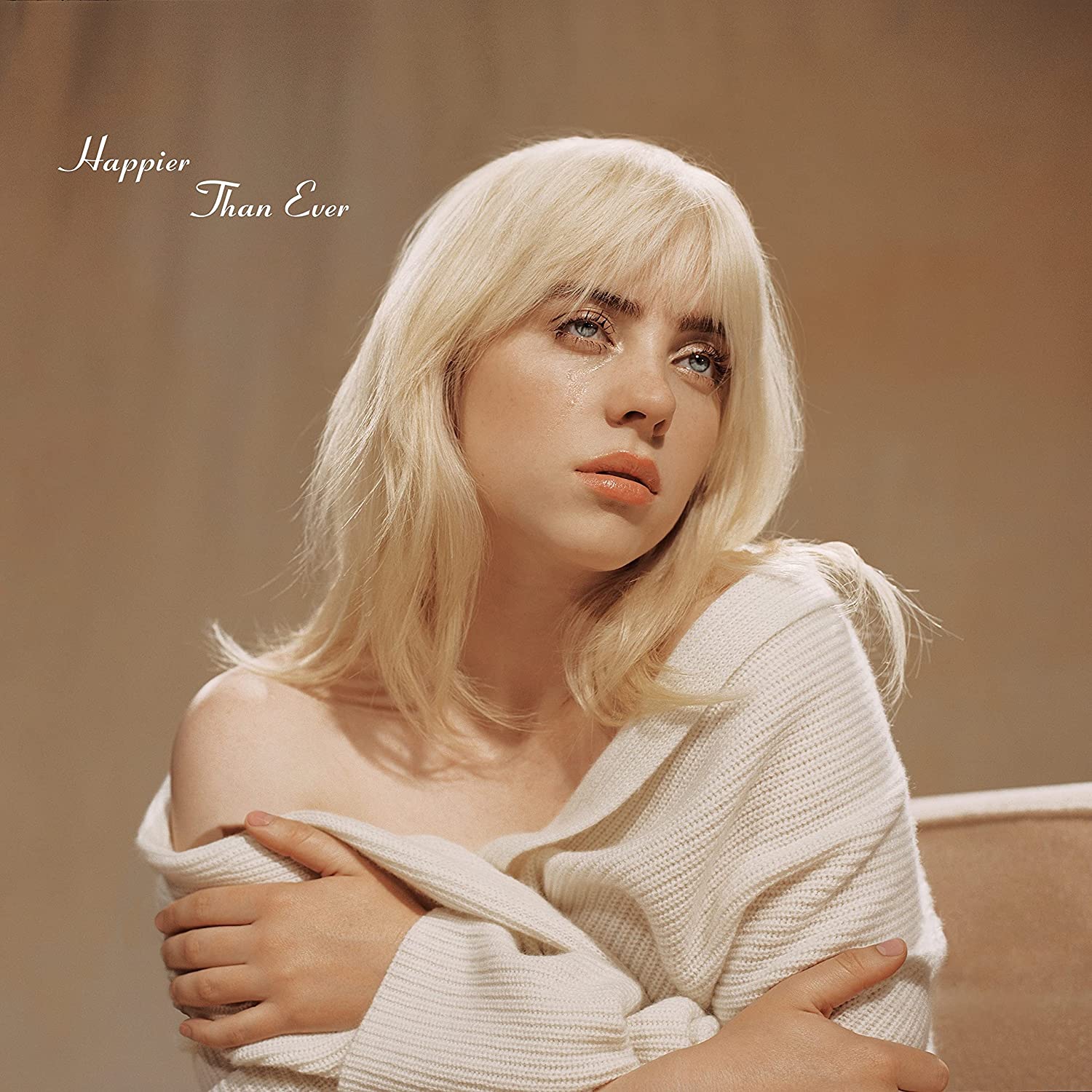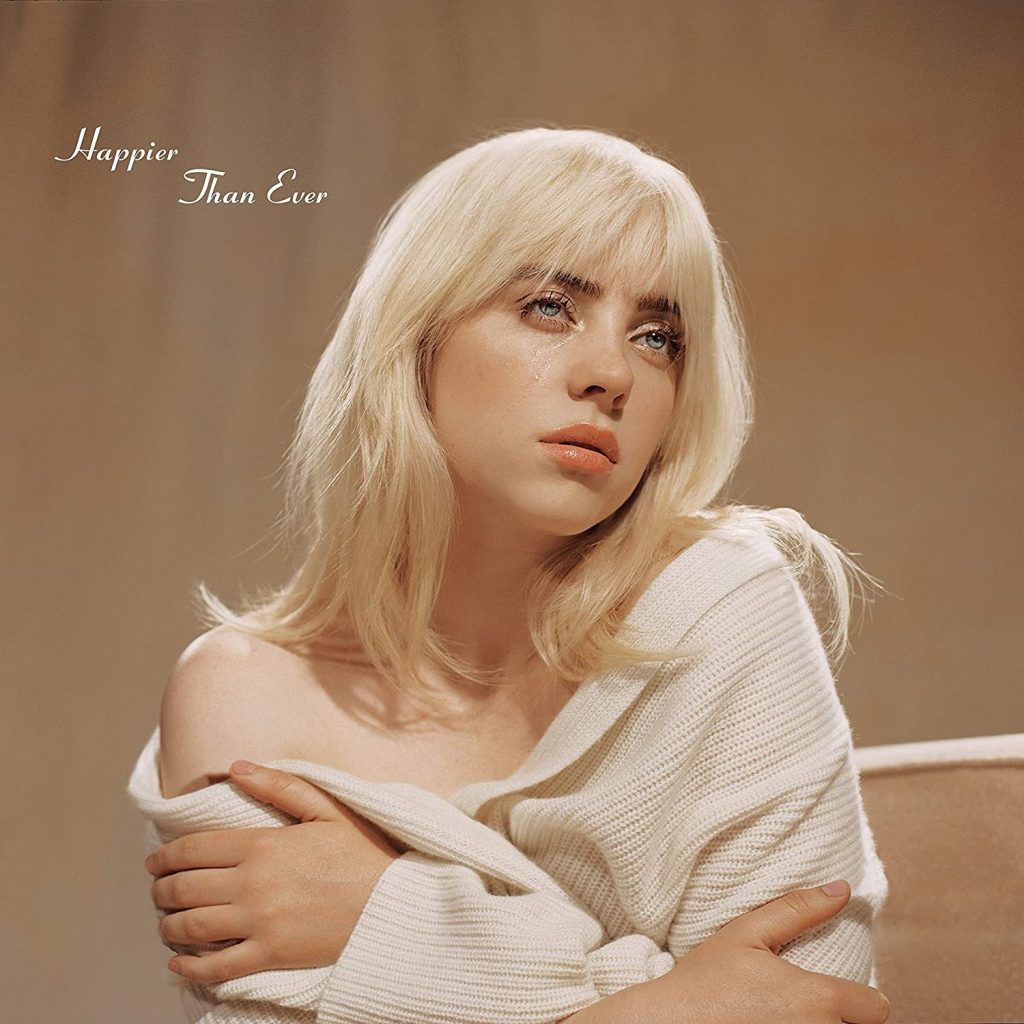

“Last year, when I was at my lowest point during the tour in Europe, I was worried I was going to have a breakdown and shave my head,” Billie Eilish confessed in a 2020 Vogue cover story. The price of Eilish’s hard-won path to pop stardom has not been lost on her. It’s long hovered in the shadows of her work, but Happier Than Ever confronts the shift in her celebrity status head-on and once again pushes sonic boundaries.
When Eilish released her debut album When We All Fall Asleep, Where Do We Go? in 2019, it altered the face of mainstream pop with its authenticity and transparency, catapulting Eilish to global success. It also irrevocably changed her relationship with fame forever. On Happier Than Ever, Eilish grapples with the paradox of celebrity culture — the realization of her dreams while balancing the suffocating aspects of being one of the biggest pop stars in the world like body shaming, stalkers, making lovers sign NDAs, depression and loneliness. While When We All Fall Asleep, Where Do We Go? tackled teen problems with cheekiness and a dash of horror — with a few exceptions like the hip-hop-tinged take on Descartes “Therefore I Am” (“Stop, what the hell are you talking about?” she laughs in the song. “Get my pretty name out of your mouth.”) — Happier Than Ever’s tone is decidedly less playful and Eilish is more jaded. On “Your Power” and “Getting Older” the singer details sexual coercion and the power dynamics that have plagued her.
Eilish’s presence in the public eye hasn’t made growing up any easier. Simmering beneath the surface of the album’s 16 tracks is a star learning how to navigate the misogynistic landscape of music. Like Britney Spears and Jessica Simpson, it’s unfortunately become impossible to talk about Eilish without talking about her body politics. The scrutiny Eilish has faced was magnified in June when she traded her neon green-dyed hair and oversized shirts for platinum blond locks and a corset for the cover of British Vogue. It wasn’t long until everyone had an opinion.
But so did Eilish, and hers is most relevant.
At the center of Happier Than Ever is “Not My Responsibility,” a spoken-word piece where Eilish relives the horrors of being papped, “While I feel your stares, your disapproval or your sigh of relief / If I lived by them, I’d never be able to move.” The affecting monologue, which she debuted at a Miami concert last year, serves as a meditative prelude to the electro-R&B “OverHeated” which addresses her own self-worth. As she confronts the media’s objectification of her body and the pressure to alter it to appease the masses, she questions if she should just give in, too: “’Cause I’m not about to redesign myself now, am I? (Am I?) Am I?”
Though her first record was flanked by trip-hop and trap, on Happier Than Ever, Eilish opts for a more stripped-down landscape. Sprinkled throughout the album is a muted layer of old Hollywood glamour — a perceived sense of joy and innocence masking the darker truth — which most prominently surfaces on tracks like “Billie’s Bossa Nova” and “My Future.” Still, she manages to redefine her sound. On “Oxytocin,” Eilish creates an atmospheric ‘90s rave scene that evokes early Nine Inch Nails through gripping synths. Perhaps the most ambitious moment on the album is its warped title track which goes from a whisper to a scream when Eilish’s crystalline vocals burst from power ballad to an explosive Metallica-esque electric guitar anthem.
Still, it’s the unwavering vulnerability of Eilish’s songwriting that makes Happier Than Ever most impressive. With “Lost Cause,” the singer pens a brutal kiss-off to a selfish ex after heartbreak: “I used to think you were shy (Shy)/But maybe you just had nothing on your mind/Maybe you were thinkin’ ’bout yourself all the time.” On “Halley’s Comet,” Eilish croons about romance on a starry-eyed piano ballad: “I’ve been loved before, but right now, in this moment /I feel more and more like I was madе for you.”
With Happier Than Ever, Eilish demolishes the shiny facade of her success. While singing about fame isn’t always so affecting, Eilish’s bleak depiction of stardom is undoubtedly stirring. It’s impossible not to empathize with the magnitude of change Eilish has endured. But she finds power in making Happier Than Ever more autobiographical than her debut. Eilish may not be happier than ever yet, but one day she just might be.


Leave a comment